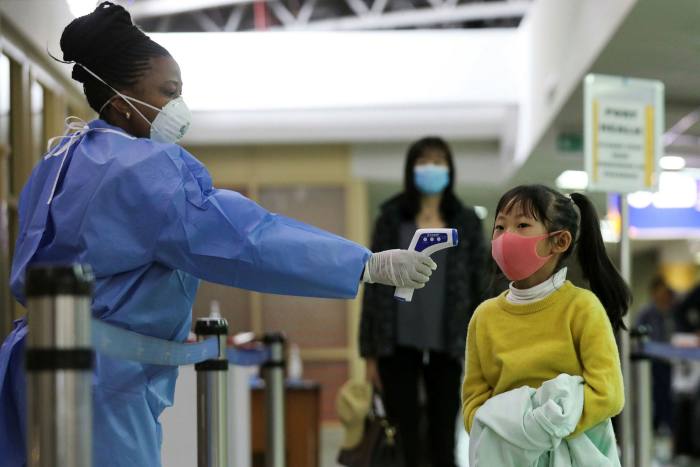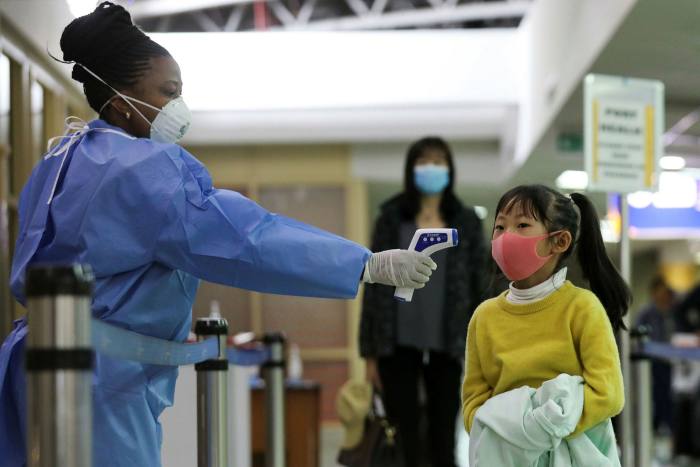 Daniel Irungu
Daniel Irungu A health worker in Nairobi, Kenya, checks the temperature of a passenger arriving from China on January 29
It’s been more than a year since the coronavirus pandemic began circulating around the world. From its difficult to trace origins in Wuhan, a Chinese province, the pandemic has seen more than 117 million cases worldwide, with an estimated 2.6 million recorded deaths.
One of the mysteries of the Covid-19 saga is that not all regions of the world are impacted equally. This Reuters news headline in December 2020, “Puzzled scientists seek reasons behind Africa’s low fatality rates from pandemic,” encapsulates an issue. Earlier, in April 2020, an Associated Press (AP) news headline said, “Africa faces an “existential threat” as virus case spread.”
What separates the Reuters headline from the AP headline is only 9 months of confusion about what is taking place on the African continent. Today the debate about the actual numbers in the 54-nation African continent is still a trending subject. With a so-called third wave in motion, like conspiracy theories, analysts are asking if this time would be the big one for Africa. The Council of Foreign Relations’ Africa in Transition blog jumped on the bandwagon recently, with a declarative headline, COVID-19 Death Rate Rising in Africa. The premise seems to be that if the rates in Africa were not rising much before, now they are. That was in January. This may be true, but the death rate in Africa from Covid-19, the focus of this discussion, remains low even while there is an uptick in infections.
It’s a fascinating back and forth, and like a cat and mouse exercise that were are accustomed to when it comes to coverage of significant, albeit realistic news from the continent in the pages of American newspapers, it is amusing. They are worth a separate investigation. And on this question of coronavirus in Africa, we’re learning a lot of new things, too.
As of March, there are an estimated 105,559 deaths, and 3,958,739 confirmed cases throughout the continent, that’s according to the tracking done by the British Broadcasting Corporation, BBC. South Africa has the highest death rate on the continent, but this report from Sky News tells us the numbers are only 40% of that of the United Kingdom.
In the United States, the death toll reached a 500,000 milestone in February, more than any region in the world. This number surpassed the number of US deaths in 3 major wars; World war II, Vietnam, and the Korean War. The story of how America, for example, caved under the weight of the pandemic that was supposed to prove American ingenuity, tells us how it’s not just national wealth or GDP alone, and big-name politicians, that define a nation.
With one unmistakable example, under the stewardship of former President Donald Trump, US leadership in the face of Covid-19 was a case of political farce. We know how the rest of the story ended. The American economy was decimated, people died because of bad leadership, blame was shifted, and a mockery was made of how science and advanced medicine can save lives.
The Opposing Media Analysis on Africa’s Low Covid-19 Death Rate
The rationalizations for why the African continent, whose combined population of more than 1.2 billion, and whose health infrastructures, often parlayed as inferior, fared better than the industrialized world, continue. We’re told the experts are puzzled. So what?
If anyone remembers, even in the midst of the pandemic, the often-cited Mo Ibrahim Foundation Index of African Governance, put out a report which pointed to declines in governance for the continent in the prior decade. So, if things seemed bad already for African governance, which by the way is more than just leadership, this alchemy of tyranny, mixed with a pandemic of historic proportions, was supposed to produce a Faustian brew of catastrophe there. But why didn’t Africa collapse under the weight of the coronavirus? If it took Operation Warp Speed, scientists, and little time, to figure out a vaccine, why are there still lingering questions, one year on, about why African nations coped better. Or, is this a game we are seeing? Are we to wait for a fourth wave before Africa gets wiped out by Covid-19 as was predicted?
In 2020 we saw big headlines that raised certain prospects about poor African countries given the severity of the pandemic. Notwithstanding the deaths that have occurred thus far, most of the doomsday predictions never came about.
On the one hand, The PBS Newshour, The Hill, NBC News, VOA News, The Washington Post, and AP, for example, published in-depth reports which gave hints about what was taking place on the continent and the actual reasons why the spread of Covid-19 was slow there. They cited the early lockdowns, their experience with diseases, community lifestyles, leadership, and coordination among nations, in dealing with the disease. Senegal, in West Africa, was used as a case in point in telling the African story.
Again, we’ve seen recent stories from NPR News, and The Guardian, for example, confirming what we already know. Kenya, in East Africa, and Tunisia in North Africa are the examples cited. These stories tell us something— that the debate in some quarters already shifted from questioning the continent’s abilities. They were now looking at the lessons we ought to learn from its handling of the pandemic.
“Under-reporting is happening all over the world, but the fragility of many African health systems and relative inaccessibility of tests – of which more than 35m have been carried out since the pandemic began, in a population of 1.2 billion – are exacerbating the problem there,” Laura Spinney of The Guardian writes in reference to the question of how the continent may not have been spared entirely of the worsts of Covid-19.
But the evidence may not be enough for The New York Times, the BBC, for example, since they are steadfast, haplessly digging for answers to questions, perhaps already answered in 2020. There are many other news organizations pursuing this line of thinking about Covid-19 in Africa. They are telling us that not counting the death, the lack of testing in Africa may be the reason why we don’t know for sure what is going on there. This prompted writer Mamka Anyona to respond swiftly to The Times’ report casting doubt on the continent’s covid statistics.
“The article doesn’t provide any evidence that reporting of COVID-19 deaths is less accurate in Africa than anywhere else, though it implies data collected by countries in Africa without the international stamp of approval are unreliable,” she writes.
Africa skeptics in the global media, those who won’t believe any good can come out of the continent, won’t accept it escaped the worst of the pandemic.

